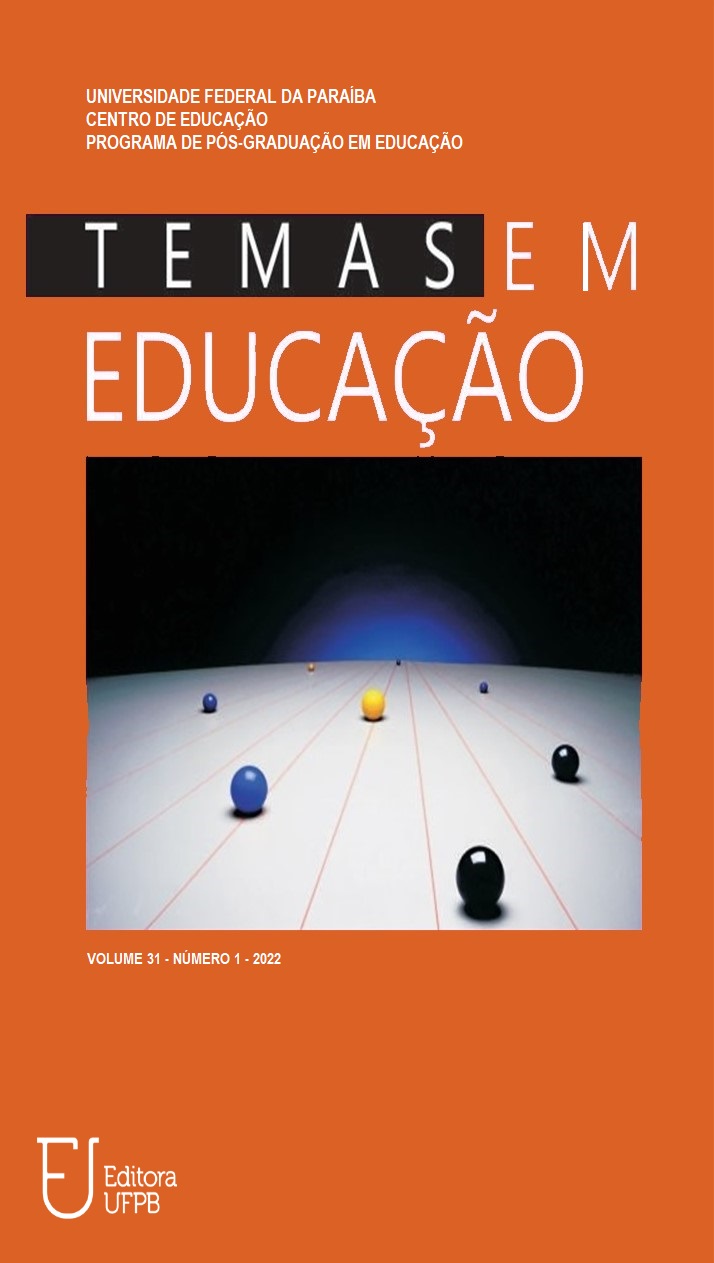The Logos Project in Piauí: formative memories of lay teachers in the Delta of the Parnaíba River (1970-1980)
DOI:
https://doi.org/10.22478/ufpb.2359-7003.2022v31n1.62461Keywords:
Ilha Grande de Santa Isabel. Lay Teachers. Logos Project.Abstract
This article aims to analyze aspects of the Logos Project, regarding the training process of lay teachers in the Parnaíba River Delta, in the riverside communities of Ilha Grande de Santa Isabel, from 1970 to 1980. Specifically, we intend to: characterize aspects of the Logos Project in piauiense territory; describe how the training process of lay teachers who worked in riverside communities of the Parnaíba River Delta took place; discuss contributions on the formation of lay teachers in Brazil, focusing on Piauí at the end of the 20th century. This is a historical research, with a qualitative approach, with methodological viéis in oral history, having as a technique of data production the full oral history interview, applied to four retired teachers. The theoretical basis included, among others: Brazil (1975; 1974; 1971), Halbwachs (2006); Meihy and Ribeiro (2021). The study showed that the Logos Project was a training policy that ecemized hundreds of lay teachers in Piauí, opportunistic and possible improvement of the quality of teaching, through the certification of a 1st grade teacher to teachers who worked without training for teaching.
Downloads
References
BRASIL. Projeto Logos II. Brasília: Departamento de Documentação e Divisão, 1975.
BRASIL. Projeto Logos I. Brasília: Departamento de Documentação e Divisão, 1974.
BRASIL. Lei n. 5.692, de 11 de agosto de 1971. 1971. Disponível em: https://www2.camara.leg.br/legin/fed/lei/1970-1979/lei-5692-11-agosto-1971-357752-publicacaooriginal-1-pl.html. Acesso em: 11 dez. 2020.
BRASIL. Parecer CFE n. 346/72. 1972. Disponível em: http://siau.edunet.sp.gov.br/ItemLise/arquivos/notas/parcfe349_72.htm Acesso em: 11 dez. 2020.
BRITO, Djanes Oliveira de Brito. O Projeto Logos e a formação de professores leigos no Piauí (1973-2001). In: SANTOS, Maria Escolástica de Moura; ARAUJO, Francisco Antonio Machado. Percursos de Pesquisas em História da Educação. Teresina: EDUFPI, 2019. p. 135-156.
BURKE, Peter. O que é História Cultural? Trad. Sergio Goes de Paula. 2. ed. Rio de Janeiro: Jorge Zahar Editora, 2008.
CATROGA, Fernando. Memória, História e Historiografia. Portugal: Coimbra, 2001.
GONÇALVES, Marli Clementino. Eu era professora, era catequista, era enfermeira, eu era tudo!: a profissão docente no meio rural piauiense (1971-1989). 2015. Tese (Doutorado em Educação) – Universidade Federal do Piauí, Teresina, 2015.
HALBWACHS, Maurice. A Memória Coletiva. São Paulo: Vértice, Editora Revista dos Tribunais, 2006.
MEIHY, José Carlos Sebe Bom; RIBEIRO, Suzana L. Salgado. Guia Prático de História Oral: para empresas, universidades, comunidades, famílias. São Paulo: Contexto, 2021.
MEIHY, José Carlos Sebe Bom. Manual de História Oral. 3. ed. São Paulo: Loyola, 2005.
MINAYO, Maria Cecília de Souza (Org.). Pesquisa Social: teoria, método e criatividade. 18. ed. Petrópolis, RJ: Vozes, 2001.
PICANÇO, Iracy Silva. Alguns elementos para discussão sobre o professor leigo no ensino brasileiro. Em Aberto, Brasília, vol. 5, n. 32, 1986, p. 09-12.
STAHL, Marimar M. Reflexões sobre a formação do professor leigo. Em Aberto, Brasília, vol. 5, n. 32, 1986, p. 20-25.
VIANA, Elane Marcia Silva; SANTOS, Cláudio Eduardo Félix dos. Política de formação de professores leigos na ditadura civil-militar e a memória de educadores no sertão da Bahia (1967 – 1983). Tempos Históricos, vol. 22, s/n, 2018, p. 659-678.
WARDE, Miriam Jorge. O professor leigo. Até quando? Em Aberto, Brasília, vol. 5, n. 32, 1986, p. 01-08.
Downloads
Published
How to Cite
Issue
Section
License
Copyright (c) 2022 Revista Temas em Educação

This work is licensed under a Creative Commons Attribution 4.0 International License.
Authors who publish in this journal agree to the following terms:
. Authors retain the copyright and grant the journal the right to first publication, with the work simultaneously licensed under the Licença Creative Commons Attribution that allows the sharing of the work with acknowledgment of authorship and initial publication in this magazine. . Authors are authorized to assume additional contracts separately, for non-exclusive distribution of the version of the work published in this journal (eg, publishing in institutional repository or as a book chapter), with acknowledgment of authorship and initial publication in this journal.
. Authors are permitted and encouraged to publish and distribute their work online (eg in institutional repositories or on their personal page) at any point before or during the editorial process, as this can generate productive changes, as well as increase impact and citation of the published work (See O Efeito do Acesso Livre).



















